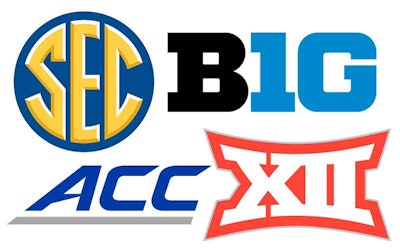
Conference officials from the Big Ten, SEC, Big 12 and ACC are circulating a draft of a first-of-its-kind document intended to prevent universities from using state laws— the kind signed by Tennessee's governor earlier this month — to violate new enforcement rules.
According to Ross Dellenger, senior college football reporter for Yahoo Sports, the power conferences' draft also requires schools to waive their right to pursue legal challenges against a new enforcement entity — the College Sports Commission.
"The document, now viewed by dozens of leading school administrators, would bind institutions to the enforcement policies, even if their state law is contradictory, and would exempt the CSC from lawsuits from member schools over enforcement decisions, offering instead a route for schools to pursue arbitration," Dellenger wrote.
The contract draft, which has not been finalized, has nonetheless been distributed to several school presidents, general counsels and athletic directors — many of whom have expressed legal concerns with several of the document’s concepts, which are now being refined, Dellenger reported.
The document, described as an “Affiliation” or “Membership Agreement,” is meant to be signed by all power conference schools, perhaps as well as others opting into the House v. NCAA settlement, as a way to bind the group and provide stability around the enforcement of rules, according to Dellenger. That includes, most notably, decisions from the new NIL clearinghouse, dubbed “NIL Go,” an entity run by accounting firm Deliotte that is expected to more strictly enforce booster pay.
Refusing to sign could put schools at risk of losing their conference membership and participation opportunities against other power league programs.
“You have to sign it,” said one athletic director who has seen the document, “or we don’t play you.”
“As a condition of membership, you must comply with the settlement and enforcement,” said a power conference president with knowledge of the document.
According to Dellenger, a finalized version of the document cannot be signed until the House settlement is granted approval from California Judge Claudia Wilken. "At that point, will all schools sign a document that, many legal experts contend, creates legal issues for public universities? Are these concepts even enforceable?" Dellenger wrote.
“Arbitration itself isn’t surprising but saying that you agree not to follow your state law … that may or may not be enforceable,” Gabe Feldman, a sports law professor at Tulane University and an expert on college sports legal matters, told Yahoo Sports. “No matter what the sides do, they’re going to be sued. This is an effort to rein in the lawsuits. It’s just not clear how enforceable all these provisions will be.”
The Tennessee law gives schools and third parties in the state “cover” not to follow rules that may be subject to antitrust scrutiny, according to sports law attonrey Mit Winter. Many of the House settlement-related concepts — most notably the clearinghouse — could be in jeopardy of such scrutiny.
“Even if Judge Wilken approves the House settlement, her order will not address whether new NCAA rules that come out of the House settlement comply with antitrust law,” Winter told Yahoo Sports. “She’s only ruling on whether the settlement agreement is fair to absent class members.”





































